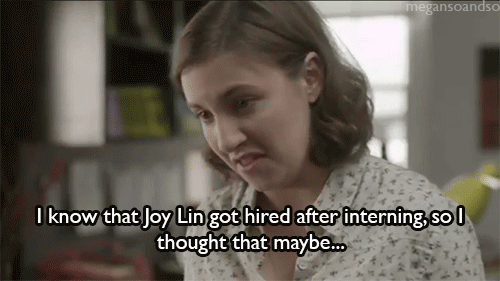So you’re an internship virgin. You don’t have the slightest clue how to go about finding an internship, let alone what to do when you actually land it. And you’re terrified of screwing up. Here are some tips from several university career centers on what not to do.
Before You Get the Internship

University of Notre Dame Career Center (Hilary Flanagan, Ray Vander Heyden, LoriAnn Edinborough):
1. “Thinking you can only find an internship posted on a website and not being creative by utilizing your network or ‘creating your own’ internship.”
If you don’t immediately find the internship of your dreams in a Google search, think about crafting your own. Your dream employer doesn’t offer internships? Shoot them an email anyway—your eagerness may be rewarded. Find a need that you can fill—whether it be getting the company started on Twitter or another social medium.
2. “Not taking it seriously and preparing a quality resume and cover letter tailored to the organization and position.”
You probably don’t like those spam emails—Dear Valued Customer!—and neither do employers. Be specific with your resume, and let it show that you possess exactly the skills this employer is looking for—proficiency in social media if you’re applying to an advertising company, for example.

3. “Depending solely on someone else to get you the internship without putting in effort researching organizations of interest to you and their opportunities.”
Hey Mom, how’s that internship search coming? Can you email me a list by Friday? No? I should try finding one on my own?
4. “Searching online in a database using one method (by major) rather than by using keywords and researching organizations individually.”
This is your future we’re talking about—you can’t be lazy when it comes to exploring the possibilities. Search for internships involving your major, skills you’d like to exercise, areas you’d like to work in or even related areas that interest you.
5. “Not tapping into funding sources, including those available through The Career Center, if needed.”
Your school wants you to get that internship. And if you can’t afford some part of it—living expenses, cost of gas, etc.—there is some sum of money waiting somewhere just for you. The University of Notre Dame offers up to $3,000 to help with internships. Go see what your school can offer you.

Boston College Career Center (Patricia Corrigan):
6. “Students searching for internships forget to notify their network that they are looking for an internship.”
Your alumni network is an invaluable resource—take advantage of older, wiser, employed people who were once in your shoes. You have an immediate connection with your alumni network, and if they aren’t hiring, maybe they can put you in connect with someone who’s looking for fresh meat.
7. “Students are unprepared; they don’t know the company mission when they interview.”
Again, you need to show the employer that you want this job. Read up on the company—what do they stand for, what are they on the cutting edge of, and how can you fit into their process?
8. “Students forget to practice for the interview, they think they can show up and responses to interview questions will seamlessly flow.”
An interview is not the place to practice your BS’ing skills. Brainstorm responses to the most common questions like “Why do you want to work for us?” Most career centers offer practice interviews as well, so if you really want to see how you’ll perform under pressure, sign up for one.

9. “Students tend to use one search engine for their internship search. You need to cast a wide net; college career center, LinkedIn, internship boards, networking and targeting companies that you would like to work for.”
Leave no stone unturned in your internship search. Thirty minutes spent on Google is not enough. To make sure you find the best internship for you, make sure you’re looking everywhere. Utilize your alumni network, your contacts and your ingenuity to find your dream job.
10. “Students don’t ask for the internship at the completion of the interview. Let the employer know that if the position is offered to you, you will accept. Forget about seeming bold, tell them you want the job.”
So you nailed your interview—you knew the answers to all the questions, you charmed your interviewer and you’re ready to walk out of their with confidence. Don’t forget to end the interview strong—with one final affirmation that you are so excited for this opportunity.

Purdue University Career Center (Susan Bush):
11. “Failing to utilize career services and resources available on campus. A plethora of information is readily available along with expertise from career counselors.”
If you aren’t even sure where your career center is, it’s time to find out. Career counselors are there specifically to help you find a job. They’re an incredibly underutilized resource. Go on, make their day—and maybe your career—by walking into their office.
12. “Not investing time to develop a quality resume and job search correspondence that closely parallels the students’ background and qualifications with the requirements of the internship position.”
Do what you’re good at—if you’re an English major and president of the creative writing club, search for internships related to publishing. If you’re having trouble nailing down exactly the kind of internship you want, take a look at your resume and see what qualities stand out about it and where your interests lie.
13. “Not preparing well for career fairs by researching companies and having intelligent questions to ask the recruiters about their employers and the jobs.”
Career fairs are another invaluable resource available to you in college. View them as an opportunity to practice interacting with employers in a professional environment. Climbing into a suit may not be the most fun thing to do during the school week, but it pays off in the form of direct contact with future employers.
WHEN YOU FINALLY GOT THE JOB

University of Notre Dame:
14. “Forgetting to say ‘thank you’ at the conclusion of the internship – it’s important not to burn bridges, even if it was not the most positive experience for you.”
So your internship was the worst 2.5 months of your life to date—still gotta say thanks for that job experience/resume builder/lesson-in-patience. A handwritten note or even a very heartfelt email works.
15. “Neglecting to stay in touch with your new professional contacts via LinkedIn – this is a prime opportunity to grow your professional network even if you decide to pursue a different industry.”
LinkedIn is like Facebook for the employed—essential for staying in touch with old employers and expanding your network to find more job opportunities. Make sure you list your skills and the field you’re interested in, as it can help employers find you.
16. “Using poor judgment and drinking too much during the company outing or celebration.”
Your boss wants to invite you to the company party in the baseball suite. He or she does not want to watch you be an embarrassment to the workplace. (That means no dancing on tables.)

17. “There is a significant gap between fitting in to office culture and making a lasting impression of the wrong kind.”
So you want to be the “cool” intern. There is a right way and a wrong way to go about crafting that image. DO take part in office culture—if the employees take the interns out for dinner once a week, don’t miss your chance to connect with people and further become a part of the community. DON’T be overeager to the point where you find yourself acting unlike yourself.
18. “Being afraid to ask questions or asking the same question over and over – do your research, take notes when you do receive answers and feedback, and offer solutions.”
It’s okay to be unsure about what you’re supposed to be doing—but make sure you never have to ask the same question twice. Carry around a notepad so you can write down important info you learn about your workplace, or even jot down some reminders in the Notes app on your phone—that is, if you’re allowed to take it out during work.
Purdue University:
19. “Focusing on fulfilling the minimum requirements of the internship without intentionally learning from the experience.”
You accepted the job, decided you didn’t like it after the first week, and now you’re stuck there. This is a lesson in having patience and understanding yourself. There is always something to be gained, even from a bad internship—new skills like the ability to sift through massive piles of boring documents and pull out the one page of important info.
20. “Underestimating the importance of practicing professional behavior in a business environment – especially among the organization’s customers or clients.”
Don’t be that intern that loses your employer a client because you couldn’t act like a professional. Watch how your coworkers interact with clients or customers—listen to their tone of voice and even observe their body language. They’ve been working here a lot longer than you have, and they know the ropes.
21. “Neglecting the opportunity to form key professional relationships with a wide variety of people in your organization.”
Internships give you a taste of what a real job in that field can be like. Take advantage of this unique perspective and connect with as many people as possible. You never know when a personal contact may come in handy later on in life.



















